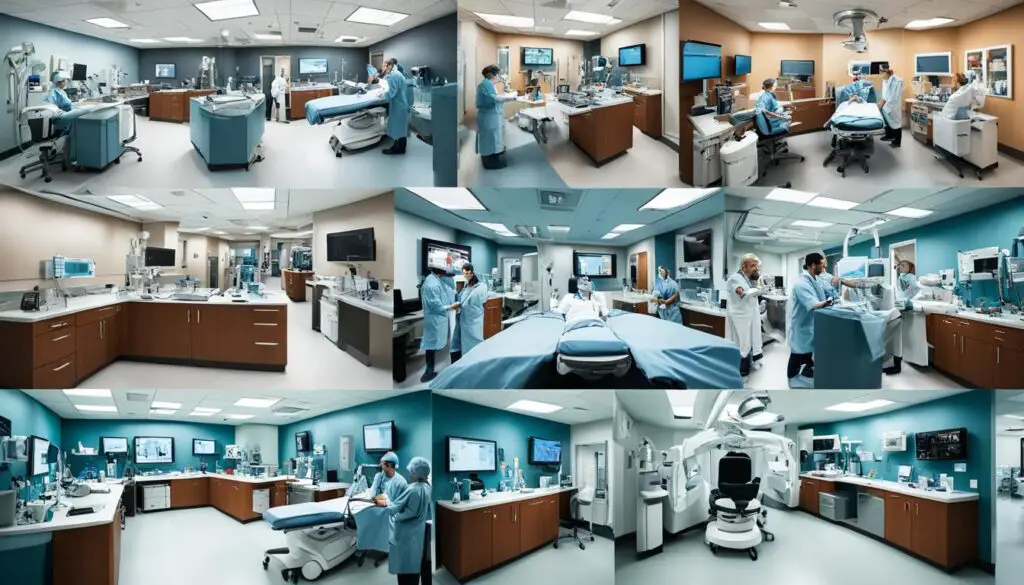
If you’re considering a career in radiology nursing, becoming an Interventional Radiology Nurse could be the ideal path for you. This role involves providing specialized care during radiology procedures, offering expert support throughout the entire medical imaging process. As an Interventional Radiology Nurse, you play a crucial role in the delivery of healthcare services, using your knowledge, skills, and talents to make a real difference to your patients’ lives.
At the heart of Interventional Radiology Nursing is a focus on providing exceptional patient care, using cutting-edge techniques and technologies to diagnose and treat a wide range of medical conditions. Whether you work in a hospital, diagnostic imaging center, or other healthcare setting, you will have the opportunity to work alongside some of the most talented medical professionals in the industry.
Throughout this article, we will explore the role of an Interventional Radiology Nurse in more detail, providing insights into the qualifications, skills, and knowledge you need to excel in this exciting field. We’ll also look at the various job opportunities available, the required training and education, and the salary, development opportunities, and promotion prospects associated with this profession.
If you’re ready to learn more about how you can become an Interventional Radiology Nurse and start your career in radiology nursing, read on for more information.
Understanding Interventional Radiology Nursing
Interventional Radiology Nurses play a crucial role in interventional procedures and patient management. They work alongside doctors and technologists to perform various radiology treatments and procedures. During the process, they monitor the patient’s vital signs, comfort, and safety to ensure everything goes as planned.
Their responsibilities include preparing patients for procedures, administering sedatives and anesthetics, and maintaining sterile conditions. They also educate patients on what to expect before, during, and after the procedure and answer any questions they may have. Additionally, they ensure that patients receive proper follow-up care and monitor any potential complications.
Interventional Radiology Nurses must possess exceptional technical skills, including knowledge of various imaging techniques and equipment usage, as well as interpersonal skills for communicating with patients, their families, and other medical professionals. They must work well under pressure, remain attentive to the needs of the patient, and possess compassion and empathy.
Interventional procedures are minimally invasive and offer less risk to the patient than traditional surgical procedures. These procedures include needle biopsies, stent placements, angioplasties, and other treatments. Interventional Radiology Nurses assist in these procedures by preparing the patient, providing support and guidance, and assisting the radiologist or physician.
Patient Management
Patient management is a crucial aspect of an Interventional Radiology Nurse’s role, ensuring that the patient is comfortable and safe throughout the procedure. They monitor the patient’s vital signs and administer medication as necessary to reduce pain and discomfort. They also educate the patient on the procedure and any potential risks or side effects.
Interventional Radiology Nurses are an essential part of the radiology team, and their contributions make a significant impact on patient care and outcomes.
Job Profile and Entry Opportunities
Interventional Radiology Nurses hold a crucial role in the healthcare industry as they assist patients undergoing radiology procedures. They are required to have significant experience and knowledge in medical imaging to provide expert care to patients.
To become an Interventional Radiology Nurse, candidates must possess at least a Bachelor of Science in Nursing degree and a valid nursing license. Additionally, obtaining a certification in radiology nursing may be advantageous in securing employment in this field.
The job responsibilities of an Interventional Radiology Nurse include administering sedatives, managing patient care during procedures, monitoring patients after procedures, and educating patients about their upcoming procedures. They play an essential role in the interventional procedures and ensure the safety and comfort of the patient.
There are various entry opportunities available in the field of Interventional Radiology Nursing, such as working in hospitals, diagnostic imaging centers, outpatient care facilities, and research institutions. Some nurses may also choose to work with specialized companies that offer healthcare services.
Demand for Interventional Radiology Nurses in Different Countries
If you’re considering a career as an Interventional Radiology Nurse, it’s important to know which countries have a high demand for these professionals. In the United States, there is a growing need for interventional radiology nurses due to an aging population and an increased emphasis on preventative and diagnostic healthcare services.
European countries such as the United Kingdom, Germany, and France also have a high demand for radiology nurses due to their well-established healthcare systems. Other countries, such as Australia and Canada, also offer promising career opportunities in this field.
It’s important to note that demand may vary depending on the specific region within each country. For example, certain areas of the United States may have a higher demand for interventional radiology nurses than others.

| Country | Annual Salary Range (USD) |
|---|---|
| United States | $61,000 to $119,000 |
| United Kingdom | £31,000 to £48,000 |
| Australia | AU$63,000 to AU$128,000 |
| Canada | C$67,000 to C$105,000 |
As you can see, Interventional Radiology Nurses can enjoy competitive salaries in countries with high demand. This makes it an even more appealing career choice for those seeking financial stability and career growth opportunities.

Training and Education for Interventional Radiology Nursing
To become an Interventional Radiology Nurse, it is essential to undergo a specific training and educational program. Usually, individuals need to have a registered nurse (RN) degree to become eligible for further training in interventional radiology nursing.
The specific courses or programs available focus on the theoretical and practical aspects of radiology nursing. The courses typically delve into the anatomy and physiology of the vascular and lymphatic systems, along with the principles and practices of interventional radiology procedures.
Programs may also include training in patient assessment, managing complications, and providing direct patient care during procedures. Additionally, Interventional Radiology Nurses need to be proficient in the use of radiology equipment, such as x-ray machines, CT scans, and ultrasound machines.
Some of the specific skills developed through formal education and training include:
- Technical proficiency in radiology equipment operation, imaging techniques, and radiation safety management.
- Critical thinking skills to assess, monitor, and manage patients during interventional procedures.
- Excellent communication skills to explain the diagnosis and treatment plan to patients, family, and other healthcare professionals.
- Ability to work on a team with other healthcare providers, including radiologists, anesthesiologists, and other medical staff.
The training and education for Interventional Radiology Nursing typically take several months to a year, depending on the program. Some programs may also offer additional specialty training in specific areas of radiology nursing.
Applying for Interventional Radiology Nurse Positions
Applying for an interventional radiology nurse position requires attention to detail and a focus on showcasing your relevant skills and experience. Employers typically look for candidates who have completed a nursing program and hold a nursing license, as well as additional certification in radiology nursing.
When preparing your application, make sure to highlight your experience with interventional procedures, patient management, and medical imaging technologies. It’s also important to demonstrate your ability to work collaboratively with physicians, radiology technologists, and other healthcare professionals.
Utilize your resume to showcase your accomplishments and specific contributions in your previous roles, emphasizing your proficiency in performing assessments, administering medication, and responding to patient needs.
During the interview process, be sure to ask questions that demonstrate your interest in the role and show that you have done your research on the employer and the position. Questions may pertain to the organization’s patient care philosophy, the specifics of the role, their expectations for interventional radiology nurses, and what qualities they value in a candidate.
Remember, applying for an interventional radiology nurse position can be highly competitive, so it’s important to make sure your application and interview stand out from the rest.
Sectors and Industries for Interventional Radiology Nurses
Interventional Radiology Nurses are in high demand in many sectors and industries. As medical imaging and healthcare services continue to advance, more opportunities are opening up for Interventional Radiology Nurses in diverse settings. Below are some of the sectors and industries where Interventional Radiology Nurses can work:
| Hospitals | Diagnostic Imaging Centers | Research Institutions |
|---|---|---|
| Hospitals are the primary employers of Interventional Radiology Nurses. They work alongside other healthcare professionals to provide expert care during radiology procedures. | Diagnostic Imaging Centers offer specialized imaging services to patients and may have several Interventional Radiology Nurses on staff to assist with procedures. | Research Institutions may hire Interventional Radiology Nurses to participate in research studies involving medical imaging and interventional procedures. |
Other sectors and industries where Interventional Radiology Nurses can seek employment include outpatient care centers, physician offices, and home health care services.

Salary, Development Opportunities, and Promotion Prospects
Interventional Radiology Nurses can expect to earn a salary that is above average in the nursing profession. According to Payscale, the annual salary for Interventional Radiology Nurses in the United States is approximately $77,000.
Furthermore, Interventional Radiology Nurses have a range of development opportunities available to them. Nurses can advance their careers by obtaining additional certification in areas such as vascular access, oncology, and pediatrics.
Promotion prospects within the profession are also positive. Experienced nurses may advance to positions such as nurse managers or clinical directors. In addition, with further education or training, they can pursue careers as nurse practitioners or nurse anesthetists, providing opportunities for specialized practice and increased earning potential.
Required Skills for Interventional Radiology Nurses
Interpersonal skills are crucial for Interventional Radiology Nurses to form positive relationships with patients as care providers. They should possess excellent communication skills, have empathy, be sensitive to the needs of others and respond well to feedback. Nurses must also be able to function well as part of a team, and work collaboratively with other medical professionals.
Technical skills are also essential for nurses working within the field of interventional radiology. Mastery of different equipment and technologies to conduct non-invasive medical procedures and analyses is required. Efficiency in computer programs and databases to maintain meticulous patient records and manage schedules is also necessary.
Knowledge of radiology modalities and instruments, and the ability to reduce radiation exposure during procedures are integral skills. The use of critical thinking and decision-making skills, combined with independent judgment in clinical situations, can ensure the trust and safety of patients while complementing overall healthcare.
Required Skills for Interventional Radiology Nurses
| Interpersonal Skills | Communication Skills | Empathy | Sensitivity to others |
|---|---|---|---|
| Technical Skills | Mastery of various equipment and technologies | Efficiency in computer programs and databases | Radiology modalities and instruments |
| Critical Thinking and Independent Judgement | Attention to Detail | Critical Analysis | Problem-solving |
Related Jobs and Professions in Radiology
For individuals interested in radiology, there are several related jobs and professions that may be of interest.
Radiologic Technologist: Radiologic Technologists use medical imaging equipment to perform diagnostic imaging procedures, such as X-rays, CT scans, and MRI scans. They work closely with Radiologists and other healthcare professionals to ensure accurate and high-quality imaging results.
Magnetic Resonance Imaging (MRI) Technologist: MRI Technologists operate MRI scanners and work closely with Radiologists and other healthcare professionals to produce images for diagnosis. They are responsible for ensuring patient safety and comfort during the imaging process.
Computed Tomography (CT) Technologist: CT Technologists operate CT scanners and work closely with Radiologists and other healthcare professionals to produce detailed images for diagnostic purposes. They are responsible for positioning patients for the best possible imaging results and ensuring patient safety.
Nuclear Medicine Technologist: Nuclear Medicine Technologists use radioactive drugs to produce images that help diagnose and treat various medical conditions. They work closely with Radiologists and other healthcare professionals to ensure accurate imaging results.
Radiation Therapist: Radiation Therapists administer radiation treatments to patients with cancer and other medical conditions. They work closely with Radiation Oncologists to develop treatment plans and ensure that patients receive the appropriate amount of radiation.
These are just a few of the many careers available in radiology. With the ever-increasing demand for healthcare services, there are many opportunities for individuals interested in pursuing a career in this field.
Questions and Answers
What is the role of an Interventional Radiology Nurse?
An Interventional Radiology Nurse plays a crucial role in providing expert care during radiology procedures. They assist in interventional procedures, such as biopsies and catheter insertions, and ensure patient safety and comfort throughout the process.
What are the responsibilities of an Interventional Radiology Nurse?
An Interventional Radiology Nurse is responsible for preparing patients for procedures, administering medications, monitoring vital signs, assisting the radiologist during the procedure, and providing post-procedure care and education to patients.
How can I become an Interventional Radiology Nurse?
To become an Interventional Radiology Nurse, you will need to complete a nursing degree, acquire relevant work experience in radiology, and obtain specialized training in interventional radiology. Certification through organizations like the Association of Radiologic and Imaging Nurses (ARIN) is also beneficial.
Which countries have a high demand for Interventional Radiology Nurses?
The demand for Interventional Radiology Nurses is high in countries like the United States, where medical imaging services are in demand, and the healthcare industry is extensive. European countries, such as the United Kingdom and Germany, also offer ample opportunities for Interventional Radiology Nurses. Other regions, like the Middle East and Australia, are also experiencing a growing need for these specialized professionals.
What training and education are required for Interventional Radiology Nursing?
Aspiring Interventional Radiology Nurses typically need to complete a Bachelor of Science in Nursing (BSN) program and obtain a registered nurse (RN) license. Specialized training programs and courses in interventional radiology nursing are also available to enhance their skills and knowledge in this field.
How do I apply for Interventional Radiology Nurse positions?
When applying for Interventional Radiology Nurse positions, you should prepare a comprehensive resume and cover letter highlighting your relevant experience and qualifications. It’s essential to research potential employers, tailor your application to their requirements, and emphasize your passion for providing high-quality patient care.
Where can Interventional Radiology Nurses work?
Interventional Radiology Nurses can work in various healthcare settings, including hospitals, outpatient clinics, diagnostic imaging centers, and research institutions. They may also find opportunities in academic institutions, where they can contribute to the education and training of future nurses and healthcare professionals.
What salary can Interventional Radiology Nurses expect, and are there development opportunities?
The salary of an Interventional Radiology Nurse can vary depending on factors such as location, experience, and the employing institution. However, Interventional Radiology Nurses generally have competitive salary potential. Additionally, there are ample opportunities for professional development and career advancement, such as specializing in specific areas of radiology or pursuing advanced degrees.
What skills are necessary for Interventional Radiology Nurses?
Interventional Radiology Nurses should possess strong technical skills related to medical imaging and interventional procedures. They also need excellent communication, critical thinking, and problem-solving abilities to provide optimal patient care and collaborate effectively with the multidisciplinary healthcare team.
Are there any similar jobs or professions in the field of radiology?
Yes, there are several related jobs and professions in the field of radiology. These include Diagnostic Radiologic Technologist, Radiation Therapist, Radiologist Assistant, and Nuclear Medicine Technologist. While each role has its specific responsibilities, they all contribute to medical imaging and patient care in different capacities.
